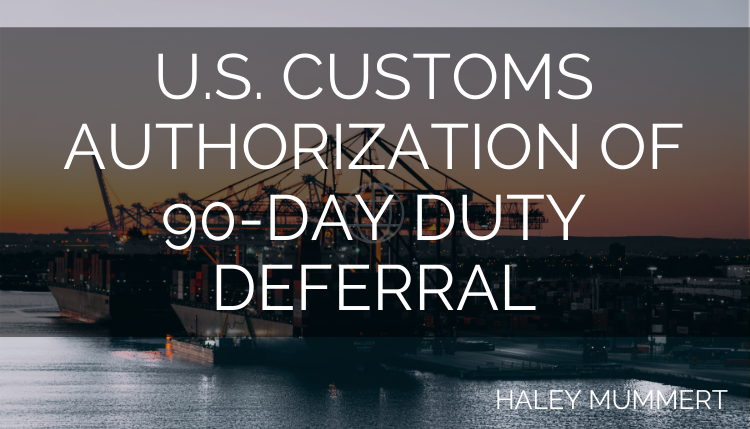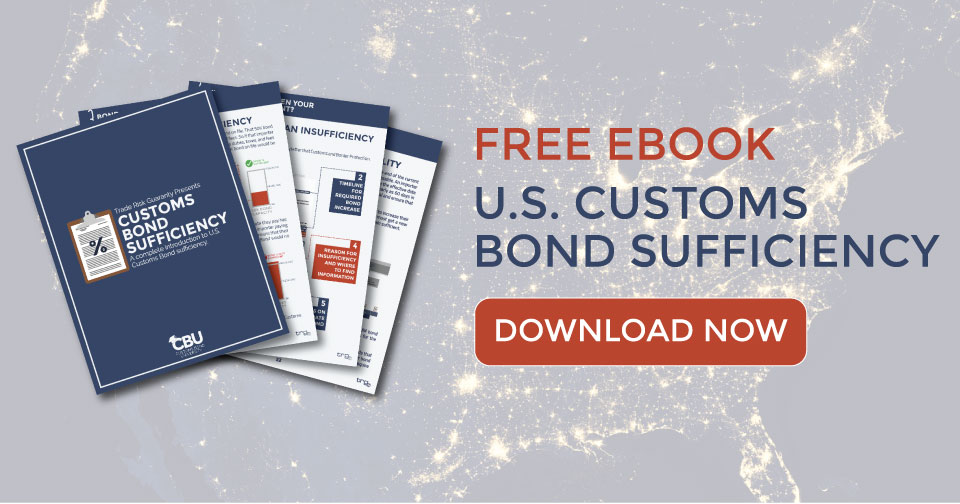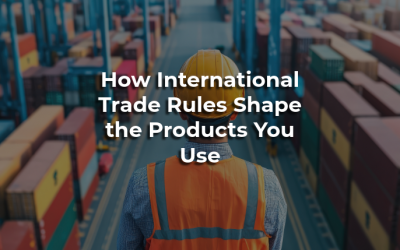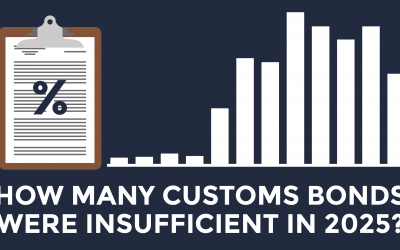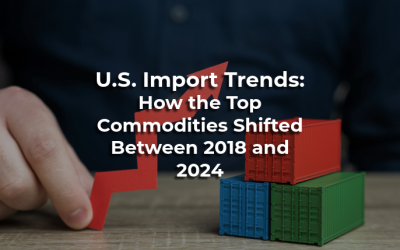On April 19, 2020, the President issued an executive order to temporarily extend deadlines for estimated duties, taxes, and fees for 90 days to provide relief for importers suffering significant financial hardship as a result of COVID-19.
The 90-day Duty Deferral is a result of the President’s proclamation declaring a national emergency on March 13, 2020. The Secretary of the Treasury and U.S. Customs and Border Protection, are amending regulations to temporarily postpone the deadline for importers experiencing significant financial hardship to pay certain estimated duties.
This temporary postponement applies only to entries made on or after March 1, 2020, and no later than April 30, 2020, by importers facing significant financial hardship. This temporary postponement does not permit the return of any deposits of estimated duties, taxes, and fees that have been paid.
No interest that would otherwise accrue upon such estimated duties, taxes, and fees will accrue during the 90-day postponement period. No penalties, liquidated damages, or other sanctions will be imposed for the delayed deposit of estimated duties, taxes, and fees per the deadline postponed under this section.
Who qualifies for the 90-day Duty Deferral?
Due to the COVID-19 pandemic, restrictions have forced the closure of import offices, and import businesses have limited their operations and procedures. Many importers will be receiving little revenue during this time while still incurring expenses like duties, taxes, and fees associated with imported merchandise.
To qualify, an importer must demonstrate significant financial hardship. More specifically:
- An importer’s operation must be fully or partially suspended during March or April 2020 due to orders from a competent governmental authority limiting commerce, travel, or group meetings because of COVID-19.
- As a result of the suspension, gross receipts of the eligible importer for March 13-31, 2020, or April 2020 are less than 60% of the gross receipts for the comparable period in 2019.
An eligible importer does not need to file any additional documentation with CBP to qualify for this relief. However, eligible importers must maintain documentation as part of records establishing that their business meets the requirements for relief.
Due to the rapid pace at which this is being implemented, the requirement process is an honor system. If you do not qualify for this relief and take advantage of it by not paying your duties, taxes, and fees within the typical timeframe, CBP could request you submit your business records from this time to verify whether you qualify or not, so beware. It is unclear how many requests like this CBP may make in the future, but they may require any or all importers that deferred their duties to submit their records in the future. Be sure to keep those records organized and ready for when they are requested.
What does not qualify for 90-day Duty Deferral?
This temporary postponement does not permit the return of any deposits of estimated duties, taxes, and fees that have been paid.
This temporary postponement also does not apply to deadlines for the payment of other debts to CBP. This includes Deadlines for the payment of bills for duties, taxes, fees, and Supplemental Duty Bills.
While no new liquidated damage fees may be issued, any that are currently due to Customs will still be subject to the typical 60-day timeframe. Same with Supplemental Duty Bills. If you have any that are now due, those will still need to be paid, and you will not be able to defer any payment under this regulation.
This temporary postponement does not apply to any entry, or any deposit of estimated duties, taxes, or fees for the entry, where the entry summary includes any merchandise subject to one or more of the following:
- Antidumping duties
- Countervailing duties
- Duties assessed under Section 232 of the Trade Expansion Act of 1962
- Duties assessed under Section 201 of the Trade Act of 1974
- Duties assessed under Section 301 of the Trade Act of 1974
Note that duty payments on these entries will still be due in the typical timeframe.
Many shipments contain commodities subject to one of these and do not qualify for duty deferral, but also includes some commodities that are not subject to any of these and qualifies for duty deferral. CBP expects importers to file separate entries when a shipment contains both merchandise that is eligible for temporary postponement and merchandise that is ineligible. If you make the entry for that shipment on one single entry summary, the entire entry will not qualify for duty deferral.
CBP notes that for some entries, the time of entry is conditional upon the deposit of estimated duties, taxes, and fees. This emergency action waives the deposit estimated duties, taxes, and fees to establish the time of entry in those instances where it would be required.
What does the 90-day Duty Deferral mean for the long-term?
Eligible importers will be required to pay the full postponed duty amount at the end of the 90-day window. Remember, that as the importer of record on the entries, you will still be liable on the Customs Bond once the duties, taxes, and fees are due. Therefore, nonpayment at the time the duties are due may result in a claim on your bond.
If a claim goes unaddressed and payment is not made, this will lead to the termination of your bond and the surety will pursue reimbursement for any losses on the bond. While this 90-day Duty Deferral is good news in the short-term, keep in mind how it may impact your business in the long-term as well.
As for the liquidation process for entries already made into the U.S., we do not expect a change in that timeframe. Keep in mind that any currently outstanding amounts due to CBP are still due as usual unless you have submitted a direct, written a request that has been granted.
The 90-day Duty Deferral is the most significant relief provided for importers at this time. This emergency action is being taken in response to the extraordinary challenges facing U.S. individuals and businesses during the COVID-19 national emergency, which significantly affects the trade community. The 90-day Duty Deferral supports American workers and businesses who are currently affected by COVID-19.
If you have other questions about this executive order, check out CBP’s FAQ page about the 90-day Duty Deferral.
Stay current on U.S. import trends. Subscribe to the Trade Risk Guaranty YouTube page.

